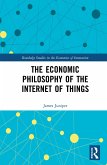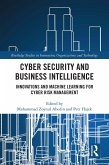Edoardo Mollona
Computational Analysis of Firms' Organization and Strategic Behaviour (eBook, PDF)
57,95 €
57,95 €
inkl. MwSt.
Sofort per Download lieferbar

29 °P sammeln
57,95 €
Als Download kaufen

57,95 €
inkl. MwSt.
Sofort per Download lieferbar

29 °P sammeln
Jetzt verschenken
Alle Infos zum eBook verschenken
57,95 €
inkl. MwSt.
Sofort per Download lieferbar
Alle Infos zum eBook verschenken

29 °P sammeln
Edoardo Mollona
Computational Analysis of Firms' Organization and Strategic Behaviour (eBook, PDF)
- Format: PDF
- Merkliste
- Auf die Merkliste
- Bewerten Bewerten
- Teilen
- Produkt teilen
- Produkterinnerung
- Produkterinnerung

Bitte loggen Sie sich zunächst in Ihr Kundenkonto ein oder registrieren Sie sich bei
bücher.de, um das eBook-Abo tolino select nutzen zu können.
Hier können Sie sich einloggen
Hier können Sie sich einloggen
Sie sind bereits eingeloggt. Klicken Sie auf 2. tolino select Abo, um fortzufahren.

Bitte loggen Sie sich zunächst in Ihr Kundenkonto ein oder registrieren Sie sich bei bücher.de, um das eBook-Abo tolino select nutzen zu können.
Management and organization theories have, in the years, developed rich methodological paraphernalia to test hypotheses. This book addresses possible applications of computer simulation to theory building in management and organizational theory.
- Geräte: PC
- mit Kopierschutz
- eBook Hilfe
- Größe: 9.02MB
Andere Kunden interessierten sich auch für
![Computational Analysis of Firms' Organization and Strategic Behaviour (eBook, ePUB) Computational Analysis of Firms' Organization and Strategic Behaviour (eBook, ePUB)]() Edoardo MollonaComputational Analysis of Firms' Organization and Strategic Behaviour (eBook, ePUB)57,95 €
Edoardo MollonaComputational Analysis of Firms' Organization and Strategic Behaviour (eBook, ePUB)57,95 €![The Economic Philosophy of the Internet of Things (eBook, PDF) The Economic Philosophy of the Internet of Things (eBook, PDF)]() James JuniperThe Economic Philosophy of the Internet of Things (eBook, PDF)44,95 €
James JuniperThe Economic Philosophy of the Internet of Things (eBook, PDF)44,95 €![The Diffusion of Information and Communication Technologies (eBook, PDF) The Diffusion of Information and Communication Technologies (eBook, PDF)]() Ewa LechmanThe Diffusion of Information and Communication Technologies (eBook, PDF)44,95 €
Ewa LechmanThe Diffusion of Information and Communication Technologies (eBook, PDF)44,95 €![Digital Channels and Social Media Management in Luxury Markets (eBook, PDF) Digital Channels and Social Media Management in Luxury Markets (eBook, PDF)]() Fabrizio MoscaDigital Channels and Social Media Management in Luxury Markets (eBook, PDF)50,95 €
Fabrizio MoscaDigital Channels and Social Media Management in Luxury Markets (eBook, PDF)50,95 €![Social and Community Informatics (eBook, PDF) Social and Community Informatics (eBook, PDF)]() Gunilla BradleySocial and Community Informatics (eBook, PDF)59,95 €
Gunilla BradleySocial and Community Informatics (eBook, PDF)59,95 €![Hacker Culture and the New Rules of Innovation (eBook, PDF) Hacker Culture and the New Rules of Innovation (eBook, PDF)]() Tim RaynerHacker Culture and the New Rules of Innovation (eBook, PDF)40,95 €
Tim RaynerHacker Culture and the New Rules of Innovation (eBook, PDF)40,95 €![Cyber Security and Business Intelligence (eBook, PDF) Cyber Security and Business Intelligence (eBook, PDF)]() Cyber Security and Business Intelligence (eBook, PDF)41,95 €
Cyber Security and Business Intelligence (eBook, PDF)41,95 €-
-
-
Management and organization theories have, in the years, developed rich methodological paraphernalia to test hypotheses. This book addresses possible applications of computer simulation to theory building in management and organizational theory.
Dieser Download kann aus rechtlichen Gründen nur mit Rechnungsadresse in A, B, BG, CY, CZ, D, DK, EW, E, FIN, F, GR, HR, H, IRL, I, LT, L, LR, M, NL, PL, P, R, S, SLO, SK ausgeliefert werden.
Produktdetails
- Produktdetails
- Verlag: Taylor & Francis eBooks
- Seitenzahl: 348
- Erscheinungstermin: 13. September 2010
- Englisch
- ISBN-13: 9781136959950
- Artikelnr.: 43821621
- Verlag: Taylor & Francis eBooks
- Seitenzahl: 348
- Erscheinungstermin: 13. September 2010
- Englisch
- ISBN-13: 9781136959950
- Artikelnr.: 43821621
- Herstellerkennzeichnung Die Herstellerinformationen sind derzeit nicht verfügbar.
Edoardo Mollona received a Ph.D degree in Strategic Management at the London Business School, and is currently associate professor at the Department of Computer Science of the University of Bologna. He has published articles and books on the application of modeling and simulation to strategic management and organizational theory.
Part 1: Why and How Using Computer Simulation for Theory Development in
Social Sciences 1. The Use of Computer Simulation in Strategy and
Organization Research Mollona, E. 2. Computational Modelling and Social
Theory: The Dangers of Numerical Representation Edmonds, B. 3. Devices for
Theory Development: Why Using Computer Simulation if Mathematical Analysis
is Available Fioresi, R. and E. Mollona. 4. Mix, Chain and Replicate:
Methodologies for Agent-Based Modelling of Social Systems Hales, D. Part 2:
Computer Simulation for Theory Development in Strategy and Organization
Theory 5. The Dynamics of Firm Growth and Resource Sharing in Corporate
Diversification Gary, S. 6. Revisiting Porter's Generic Strategies for
Competitive Environments using System Dynamics Kunc, M. 7. Rivalry and
Learning among Clustered and Isolated Firms Boari, C., Fioretti, G. and
Odorici, V. 8. Organization and Strategy in Banks Cappellini, A. and A.
Raimondi. 9. Changing Roles in Organizations: An Agent-Based Approach
Lamieri, M. and D. Mangalagiu 10. Rationality Meets the Tribe: Recent
Models of Cultural Group Selection Hales, D. Part 3: How to Build
Agent-Based Computer Models of Firms 11. An Agent-Based Methodological
Framework to Simulate Organizations or the Quest for the Enterprise: jES
and jESOF, Java Enterprise Simulator and Java Enterprise Simulator Open
Foundation Terna, P. 12. From Petri Nets to ABM: The Analysis of the
Enterprise's Process to Model the Firm Ferraris, G.
Social Sciences 1. The Use of Computer Simulation in Strategy and
Organization Research Mollona, E. 2. Computational Modelling and Social
Theory: The Dangers of Numerical Representation Edmonds, B. 3. Devices for
Theory Development: Why Using Computer Simulation if Mathematical Analysis
is Available Fioresi, R. and E. Mollona. 4. Mix, Chain and Replicate:
Methodologies for Agent-Based Modelling of Social Systems Hales, D. Part 2:
Computer Simulation for Theory Development in Strategy and Organization
Theory 5. The Dynamics of Firm Growth and Resource Sharing in Corporate
Diversification Gary, S. 6. Revisiting Porter's Generic Strategies for
Competitive Environments using System Dynamics Kunc, M. 7. Rivalry and
Learning among Clustered and Isolated Firms Boari, C., Fioretti, G. and
Odorici, V. 8. Organization and Strategy in Banks Cappellini, A. and A.
Raimondi. 9. Changing Roles in Organizations: An Agent-Based Approach
Lamieri, M. and D. Mangalagiu 10. Rationality Meets the Tribe: Recent
Models of Cultural Group Selection Hales, D. Part 3: How to Build
Agent-Based Computer Models of Firms 11. An Agent-Based Methodological
Framework to Simulate Organizations or the Quest for the Enterprise: jES
and jESOF, Java Enterprise Simulator and Java Enterprise Simulator Open
Foundation Terna, P. 12. From Petri Nets to ABM: The Analysis of the
Enterprise's Process to Model the Firm Ferraris, G.
Part 1: Why and How Using Computer Simulation for Theory Development in
Social Sciences 1. The Use of Computer Simulation in Strategy and
Organization Research Mollona, E. 2. Computational Modelling and Social
Theory: The Dangers of Numerical Representation Edmonds, B. 3. Devices for
Theory Development: Why Using Computer Simulation if Mathematical Analysis
is Available Fioresi, R. and E. Mollona. 4. Mix, Chain and Replicate:
Methodologies for Agent-Based Modelling of Social Systems Hales, D. Part 2:
Computer Simulation for Theory Development in Strategy and Organization
Theory 5. The Dynamics of Firm Growth and Resource Sharing in Corporate
Diversification Gary, S. 6. Revisiting Porter's Generic Strategies for
Competitive Environments using System Dynamics Kunc, M. 7. Rivalry and
Learning among Clustered and Isolated Firms Boari, C., Fioretti, G. and
Odorici, V. 8. Organization and Strategy in Banks Cappellini, A. and A.
Raimondi. 9. Changing Roles in Organizations: An Agent-Based Approach
Lamieri, M. and D. Mangalagiu 10. Rationality Meets the Tribe: Recent
Models of Cultural Group Selection Hales, D. Part 3: How to Build
Agent-Based Computer Models of Firms 11. An Agent-Based Methodological
Framework to Simulate Organizations or the Quest for the Enterprise: jES
and jESOF, Java Enterprise Simulator and Java Enterprise Simulator Open
Foundation Terna, P. 12. From Petri Nets to ABM: The Analysis of the
Enterprise's Process to Model the Firm Ferraris, G.
Social Sciences 1. The Use of Computer Simulation in Strategy and
Organization Research Mollona, E. 2. Computational Modelling and Social
Theory: The Dangers of Numerical Representation Edmonds, B. 3. Devices for
Theory Development: Why Using Computer Simulation if Mathematical Analysis
is Available Fioresi, R. and E. Mollona. 4. Mix, Chain and Replicate:
Methodologies for Agent-Based Modelling of Social Systems Hales, D. Part 2:
Computer Simulation for Theory Development in Strategy and Organization
Theory 5. The Dynamics of Firm Growth and Resource Sharing in Corporate
Diversification Gary, S. 6. Revisiting Porter's Generic Strategies for
Competitive Environments using System Dynamics Kunc, M. 7. Rivalry and
Learning among Clustered and Isolated Firms Boari, C., Fioretti, G. and
Odorici, V. 8. Organization and Strategy in Banks Cappellini, A. and A.
Raimondi. 9. Changing Roles in Organizations: An Agent-Based Approach
Lamieri, M. and D. Mangalagiu 10. Rationality Meets the Tribe: Recent
Models of Cultural Group Selection Hales, D. Part 3: How to Build
Agent-Based Computer Models of Firms 11. An Agent-Based Methodological
Framework to Simulate Organizations or the Quest for the Enterprise: jES
and jESOF, Java Enterprise Simulator and Java Enterprise Simulator Open
Foundation Terna, P. 12. From Petri Nets to ABM: The Analysis of the
Enterprise's Process to Model the Firm Ferraris, G.







